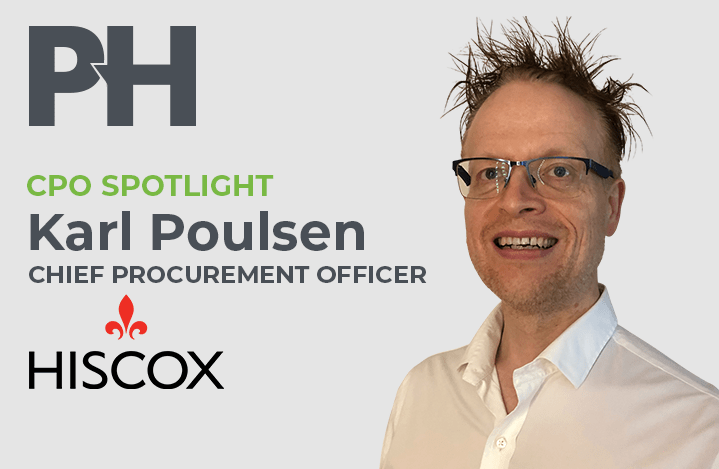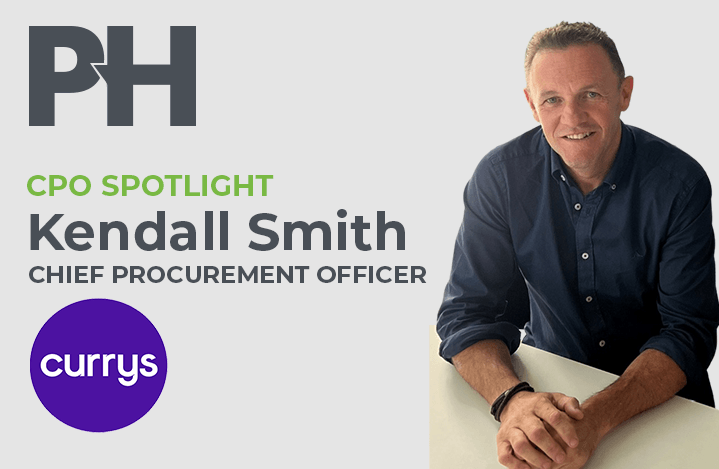For Procurement Heads’ latest CPO Spotlight, he spoke with James Dobbin about what drew him to financial and professional services and what some of the biggest challenges facing the sector are.
How much has changed in the world of Procurement since we last spoke in 2019?
It seems like a lifetime ago!
Lots has changed, lots in the economy, the wider society, and geo-political events as well all impacting the supply chain as well as the pandemic, the list is almost endless.
They have produced really big challenges for the profession and myself and my colleagues have been facing those right the way through that time period.
You spent a large chunk of your career in the professional and financial service space, what drew you into that sector and what keeps you in it?
What keeps me in it is the variety, it is just the most amazing place to work from retail banking through to investment banking to insurance, the scale of the challenge and different people is just immense.
That is a challenge professionally to keep on adapting to different stakeholders, the variety is key.
How would you compare the financial and professional services world to perhaps other disciplines in terms of the complexity of procurement?
Complexity in a predominantly service environment is different to goods and material things.
Not saying one is worse or better, they are just different.
Any job in procurement is a people job, you have got to get on with your stakeholders, but also be supportive and understanding the customer.
What are we delivering for our end customer. That is particularly what I like about insurance, many of us are dealing with our customers in their particular hour of need and that is a massive focus of the job ensuring that service experience is not just good, but is really good and we really help those people.
You previously identified risk mitigation as one of the big procurement trends, is that still the case today, or as CPO at Hiscox, are you seeing other trends now?
We are definitely seeing other trends, but it is still there.
Obviously, in financial service, we are a heavily regulated environment, but some of those challenges that you asked me about at the start in terms of what has changed are challenges of risk.
So, the terrible events in Ukraine with the war is an awful human story, but immediately people want to know what suppliers you have got there and that all comes down to the level and scale of initial and ongoing due diligence you have been able to do on the supply chain to give confidence to stakeholders in the veracity of the responses you are able to give.
How would you say procurement is viewed at Hiscox?
You’d have to ask my colleagues to get a really dispassionate view of that!
At the risk of prodding out a cliché we are definitely on a journey, we started that with my appointment about a year ago we were existing as a discipline in lots of different silos within the business we’ve brought those together now, and we are starting to concentrate on holistic spend patterns across the business and service issues on that and we are starting to add value to that.
And as you start to add value your currency internally goes up as a discipline which is great, but we are at the early stages of that journey.
You’re here in our new London offices, and most of the exec team is here, even though it is a Friday, so if you run into them you’ll be sure to tell me what they say won’t you!
How big is the Procurement function now?
People wise there are 14 of us at the moment, which is up 50% from this time last year.
We have been at the marketplace looking for the right kind of talent, during the course of that to make sure we are getting the people in that can help us grow the function and grow the commerciality of the business.
How do you break down the function in terms of category and spend and what sort of things will you be looking for moving forward?
We have adopted an approach around the categories within that we have a team that do general and direct stuff and a specialist team in IT and some division within that, software and services.
All of those good things that practitioners would expect to see.
But principally it is around partnering the business, we do it like that as it is convenient, and it is good for the guys to have real specialist knowledge but the principal thing I am looking for is how good they are at forming those relationships with people.
It is a bit of a given that you know your stuff and your numbers but how do you get on with people, how do you story tell, how do you convince them, how are you able to get that special relationship going that is really important.
When you’re interviewing how do you spot those traits?
I know Procurement Heads and HR Heads will have views on that but look I mean this is all about gut feel.
Of course, the stories that they have got to tell are great, but it is how you put those to the test and the conversation.
Some people you do get on with during an interview and it is always really good to have another perspective.
One thing I do when I am looking for category talent is any internal stakeholders who are involved in it, I involve them too to really get a collective view on what we are seeing that is really important.
On the topic of sustainability, what role does the CPO play in shaping an agenda?
We are definitely shaping that now, we have great ESG philosophies and goals at Hiscox and it is one of the reasons that attracted me to the organisation being able to shape that from a supply chain perspective was relatively immature at the time.
Of course, we are looking at things like greenhouse gas emissions and where our suppliers are with that, the policies that they are putting in place to lower their impacts on the environment.
Frankly as well we are also looking at our social sourcing, what are we doing to help social enterprises get a foot through the door to help areas that they themselves are helping and there is a lot of support for that around the senior table which is really good.
What do you see are the biggest procurement challenges to your sector currently?
There are a few and this is just in the order that they are occurring to me, not in the order of any importance…we are living through tough economic times at the moment that probably none of us has seen in our careers to date.
The interest rates and inflation we are seeing is really reminiscent of the 80s and the 70s rather than the 00s, which is a challenge.
There is very little muscle memory in any organisation as to how it copes with that.
Of course, that puts different pressures on suppliers as to where they are in the supply chain and our partners are looking for new strategies to cope with those and the sort of pressures they see.
That just puts more focus on us collectively as to how we can be more efficient and take a lot of the rough edges of those general inflationary positions by doing things differently and challenging the status quo and so on.
It is not just a question of knowing what it is and following it through, that is not what the profession has ever done and it is not what it is doing now so that is great.
What makes Hiscox a great place to work and why is it unique?
This is an incredible entrepreneurial organisation, it has grown massively in the last couple of decades or so in its DNA.
The people make it great, we have at our core a challenging mindset, an entrepreneurial one and we all want to come to work to do the best we can for the organisation and our shareholders and stakeholders.
What I see here that is different from other places I work is the real focus on creating that engagement with colleagues and that really is a specialism of the organisation.
What advice would you give someone thinking of getting into procurement?
It is very straightforward advice and that is to learn how to get on with people and how to influence them in the right way.
That is absolutely key to being successful in this business.
There are a few entry-type criteria, you need to know your numbers, and you need to know your specialism, that is the sort of thing you can learn, it is those softer skills and being conscious about how you are developing yourself, constantly challenge yourself, expose yourself to new challenges of the organisation, to new disciplines and I don’t think you’ll go wrong.
What would be your advice for someone approaching a negotiation?
I think we are born as human animals as great negotiators, the best negotiation I ever see is in a school and with my kids.
Sooner or later the social norms tend to take that away from us and it is just reconnecting with those childhood views in a way and just being a bit cheeky!
That’s what this is about, sometimes we are playing poker you need to be cheeky and understand what the fallback position is.





